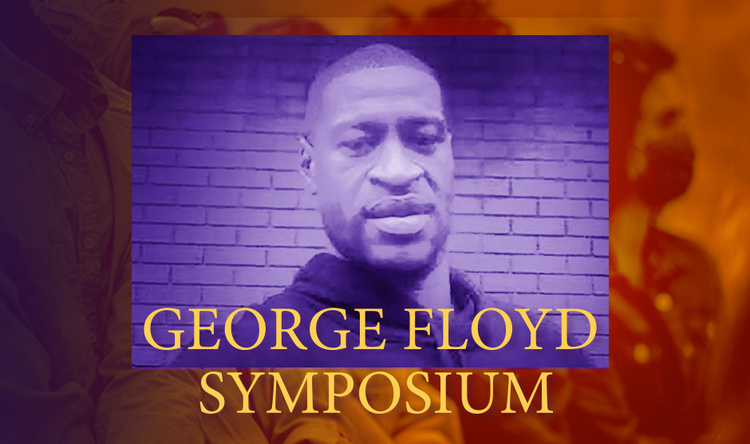Floyd family visits Kingsville
The tragic death of former Texas A&M University-Kingsville (TAMUK) student, George Floyd sparked a revolution.
Floyd attended TAMUK from 1995-96 and in 1997 as well.
His wrongful death, sparked anger. Floyd’s murder led people around the world to join together to protest a demand for change further pushing the Black Lives Matter movement.
Created in 2013 by Alicia Garza, Patrisse Cullors and Opal Tometi, #BlackLivesMatter began as a Black-centered movement in response to the clearing of Trayvon Martin’s killer. Since then, #BlackLivesMatter has been used to amplify racism towards people in the Black community across the country.
Dr. Natasha Croom, a critical race feminist scholar and professor of Higher Education and Student Affairs in the College of Education at Clemson University, and TAMUK alumnus, was the keynote speaker invited to the university’s George Floyd Symposium, Social Justice: Perspectives and Reflections from the United States on Monday, Nov. 1, which the President’s Council on Climate, Diversity and Inclusion at TAMUK held.
“It is important that students take these opportunities to learn and unlearn,” Croom said. “Learn in ways that both validate their experiential knowledge and challenge and push them to understand and know in more complex ways. And, unlearning what they think they might know which may be inadvertently contributing to on-going inequities and injustices.”
During her speech, Croom mentioned how important it is for people who talk about equity and social justice to share their beliefs about these topics. She also went on to discuss the exploitation, marginalization, imperialism, physical and psychological violence members of the Black, Latinx, Hispanic, Indigenous and Asian communities face daily.
“Now is the time for educators, students, staff and administrators to engage with ideas, theories and practices that can be used to disrupt inequality and inequity,” Croom said.
While many people are familiar with the Brown v Board of Education case, which was intended to end school segregation, without the activism of a Mexican Puerto Rican family (Felicitas and Gonzalo Méndez), the Brown case would not have been possible.
Not only did the family refuse to participate in school segregation, but their case also ended school segregation in California as a whole. This successful case paved the way for public school reform and laid the groundwork for the Black legal team in Brown v Board of Education.
The second speaker invited to TAMUK’s symposium was Dr. Anika Casavantes Bradford, a TAMUK alumnus who is a nationally recognized advocate for first generation, Latinx, undocumented and military students.
Bradford is an Associate Dean and Associate Professor at the University of California, and her particular focus is on Cuban refugees as they come to the United States.
“Before I begin, I want to recall the name of the man whose memory is being honored here today: George Floyd,” Bradford said. “This is the man whose name resonates with the unspoken names of all of those who have lost their lives to ignorance and hatred. It’s a name that has inspired a multicultural movement to assert the equal worth of Black lives and guides a new generation’s efforts to confront history built on division, in order to build a new future together.”
Bradford said her interest in advocating for social justice began in high school, by learning about religious Catholic traditions.
“I think it’s important for people to understand that present-day social justice efforts, whether they are for equal pay or marriage equality or the Black Lives Matter movement, are a continuation of these efforts and are thus very much part of a broader American historical tradition of popular struggle for fairness, dignity and equal opportunity,” Bradford said.
During her speech, Bradford explained how there are varied and broad roots of social justice values in the United States. These values are what helped inspire leaders of different movements throughout the decades. One of the main driving forces behind the social justice movements demanding government reform, is the main recipients were of the white working American class.
Because of the many decades of activism from Black, Latinx, Asian and Native American people, conviction of social justice has increasingly inspired legislation and programs that address the harmful racial inequality in our nation, she said.
Since then, many more varied forms of social justice activism have come to light. Despite the diverse forms, one thing unites all the causes, which includes the desire for everyone to be able to enjoy freedom, safety, dignity and opportunity.
However, injustice comes in all forms and looking back at the patterns of racialized inequality makes things harder for people of color, but social justice is possible when we invest time and effort into improving the chances of marginalized groups’ lives, she said.
Overall, Croom and Bradford’s speeches shared similar messages: everyone is a human who deserves fairness, regardless of who they are and how dark their skin tone is.
Among the many people who dedicated their time to make this symposium possible were TAMUK Alumnus Jorvis McGee. McGee traveled back to Kingsville from Atlanta, Ga., to attend the symposium because he felt it was his duty as a member of the Black Student Union and the Javelina Alumni Association.
“This was important because of the current climate and situation we are in. A human being was murdered, so it was a great event for people in our community to go to and to create an atmosphere to start having conversations on how we can move the efforts forward,” McGee said.
Along with Croom and Bradford, McGee also had the opportunity to meet with some of Floyd’s family, his aunt Kathleen Jones McGee and cousins, Tera Brown and Shareeduh McGee.
The family had never been to Kingsville before and said attending the symposium to honor their nephew and cousin would make for a chance to experience Kingsville for the first time.
“[Floyd’s] family is just like any other family,” McGee said. “They are lovable, have careers and are just normal people who had to experience what happened to their family member.”
Monday’s symposium was an opportunity for everyone to reflect on the impending social injustice faced by the country, and allowed those in attendance to see how George Floyd will continue to impact not only TAMUK, but the country.

McGee: He loved this place
Makaylah Chavez
The name George Floyd is a name to never forget. It is one that brings feelings of sorrow and heartbreak amongst most, but also of change and movement. Floyd was a black man who was killed by former police officer Derek Chauvin in May 2020. He was handcuffed and pinned down on his neck by the police officer’s knee for several minutes to the point where Floyd stressed multiple times that he was unable to breathe. His pleads were ignored by all four officers at the scene and as a result, this led to the death and murder of George Floyd.
In honor of TAMUK alumnus George Floyd and the movement that followed, Texas A&M University-Kingsville (TAMUK) dedicated and hosted a symposium open to all, in which two guest speakers attended and spoke on social injustice. Members of Floyd’s family were in attendance.
Shareeduh McGee, first cousin to Floyd, attended the event, along with her sister and mother.
“Anytime that we see anything positive in light of the tragic way he was taken from us makes us feel good and it’s even more touching because he was a part of this university,” McGee said.
Floyd attended Texas A&M University-Kingsville during the 1995-1996 school year and part of 1997. He played football during his time in Kingsville. “He loved this place when he was here, so having this university honor him is very special,” McGee said.
The symposium consisted of two speakers who had two very different takes on the perspectives and reflections of the movement that followed the unjustifiable death of Floyd.
“To hear their conversations and the suggestions that they made on how we can all get involved and all be a part of the change we want to see felt good,” McGee said. “I was moved by what they were saying.”
McGee stresses the importance of voting as an opportunity to use our voice to impact future legislation.
“I would say that getting out and voting, registering to vote, helping to get other people registered and just lobbying for those things are important to make sure that we see the changes that we need so that we have true social justice and equity,” McGee said.
Since his passing, his family has been committed to advocating against police brutality and promoting human rights with the George Floyd Foundation.

